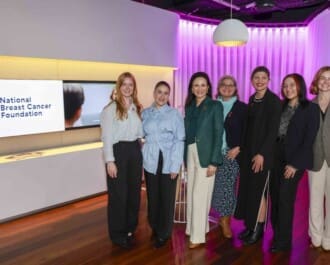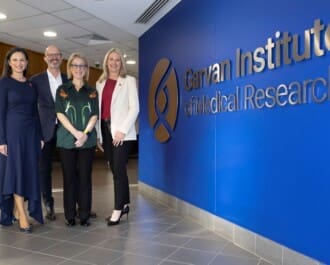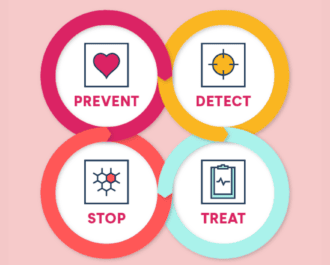
A drug already shown to be effective in other cancers has great potential to be developed as a treatment for one of the most aggressive types of breast cancer, affecting thousands of women every year in Australia.
Around 10-15% of breast cancers are Triple Negative Breast Cancers (TNBC) which lack the estrogen and progesterone receptors and have very low amounts of the protein HER2. TNBC tends to affect younger women, is more aggressive and due to a lack of treatments that specifically target this type of cancer, people with TNBC tend to have a poorer outcome.
Men and women with TNBC are often given chemotherapy which unfortunately damages both healthy cells and cancer cells, causing toxic side effects. There is an urgent need for the development of new, effective treatment options for TNBC.
Associate Professor Theresa Hickey is the Scientific Program Leader of the Dame Roma Mitchell Cancer Research Laboratories, Adelaide Medical School, University of Adelaide. She is an internationally recognised breast cancer researcher striving to find new treatment options for people with TNBC. Associate Professor Hickey is funded by NBCF and her research investigates how new cancer drugs could exploit specific features of aggressive cancer cells, such as the need to multiply more rapidly than healthy cells.
One of the proteins that plays a key role in the growth of breast cancer cells is CDK9. Drugs that reduce the action of CDK9 have been proposed as potential treatments for TNBC however, there have been no specific CDK9 inhibitors that are effective, and that don’t cause toxic side effects. In her research, Associate Professor Hickey collaborated with colleagues at the University of South Australia to test a new drug that specifically inhibits CDK9.
Professor Shudong Wang developed the CDK9 inhibitor (CDDD11-8) for the effective treatment of acute myeloid leukaemia, and this new NBCF-funded research investigated if it could have a similar effect on TNBC cells.
“We developed CDDD11-8 as an effective CDK9 inhibitor for cancer therapy and we are very excited about its potential against triple negative breast cancer shown by Associate Professor Hickey,” said Professor Wang.
The early-stage research used cancer cells in the laboratory as well as cancer tissue from people with TNBC. These cancer models are used for pre-clinical drug discovery and testing.
“Our pre-clinical study shows that the drug was able to stop the tumour cells from multiplying and did not adversely affect the healthy cells in breast tissue taken from patients. It is still early days but based on this initial evidence, we believe inhibiting this protein CDK9 could lead to a new treatment for triple negative breast cancer and this drug should be developed further,” said Associate Professor Hickey.
The results from this study are extremely promising and provide the necessary proof-of-principle required for future studies and clinical trials. Researchers are also investigating if this new drug will be even more effective when used in combination with either chemotherapy or other emerging targeted treatments.
These future studies will help to identify which people will benefit the most from this new non-chemotherapy treatment and is one example of how NBCF is helping to accelerate innovative research that is needed to end deaths from breast cancer.
The findings from this study were published in the journal Oncogene.
More News Articles
View all News


